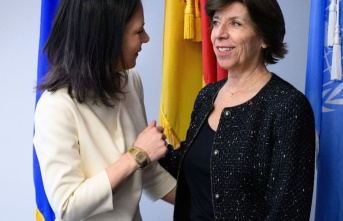"were found On the evenings young women on the roadside," says Hessen Sayah. "Most of the residents see them, and then we must act quickly", says the head of the Department for migration Affairs of Caritas in Lebanon. The women are migrant workers in Lebanese households clean, the care of children and cook food.
Because many employers are not able to pay due to the economic crisis in Lebanon for months, you want to get rid of some and put them on the road. "We often meet with a very scared, desperate, destitute women," says Sayah. "We try to help you out with the means available to us."
Overtime, and no contenta Total of 120 women, Caritas cared for in a women's shelter, provides medical, ensures that you will be able to speak with their families in their countries of origin, and also helps in legal matters. One of them is a 20-year-old woman from Ethiopia who does not want to call your name. "I have worked in two-house until 2: 30 in the morning. And I had to get up at 5 30 again,“ says the young woman in a Video of Caritas Lebanon.
"My Boss has not paid me for months, and it has beaten me often. Water I have been drinking secretly in the bathroom - and there was not food sufficient," she says in Arabic. "My Boss at the time had said that they will not let me go, she also has my passport. I want to go home to Ethiopia." A total of 37 women from Ethiopia are housed at Caritas, says Sayah. The other 83 women from different African and Asian countries, including Ghana, Bangladesh and the Philippines.
Sleep in front of the Consulate of EthiopiaSometimes, says Sayah, bring the employers to the women directly to Caritas, because they no longer knew how to help herself. Others put them in front of their respective embassies, so they take care of you. Some women run away, but also easy. For weeks, dozens of work and sleep, therefore, migrants in front of the Ethiopian Consulate in Beirut, in the hope to get help for a return trip to Ethiopia.
Makda is 21 years old. Her employer dumped her against her will, with her suitcase in front of the Consulate. "Madam has not paid me my last salary. You also said that you could not pay me the Ticket to go home," she says of the organization Amnesty International. The police saw you in front of the Ethiopian Embassy in tears and then call their employer. "She came to give me my passports, and my documents. Then she was gone again. What I should I do now?"
The situation is dramatic, a crisis in the crisis, called Hessen Sayah. To be the economic crisis, the Corona came a crisis and the Lockdown have migrants, the problems between the Work and their employers partially tightened.
Because the Problem goes beyond the already far over the front of the Embassy involuntarily camping women. According to official data, more than 250,000 of work to be migrant workers in Lebanese households employed. Usually you will receive from recruitment agencies recruited with the promise of a salary in US dollars to which you can send to their families back home.
The dark figure is twice as highly valued - many migrant workers without papers in the country and will not be covered. They clean in private households, clean the buildings, pick up the garbage or to do kitchen work in Restaurants.
#EndKafala - the System needs thechange Behind the much criticised so-called Kafala System, which combines a work visa to the Migrants with the name of your or your employer's. Of these, the "Kafil", is regarded as the surety and Sponsor. As soon as the in-house employees to enter the Lebanese soil, to assume the employer's legal responsibility for you - most of the domestic workers live in their employers. For their activities they receive between 150 and 250 US dollars salary per month.
Some employers take the passports. In the past, there were always reports about that salaries are not paid on time and there are many a maximum of one day off per week. Also sexualised, physical and psychological violence in this Situation is not uncommon.
Should resolve the employer, or the employer, the employment relationship, the migrant illegality and deportation. Numerous organisations have criticised for years by the Kafala System created dependency. Therefore, Caritas Lebanon has launched a campaign under the Hashtag #EndKafala.
"We want this System to change. Because this System offers the possibility to violate the human rights of migrant workers,“ says Hessen Sayah of Caritas. Since a few weeks they were in close contact with the Ministry of labour, the wool take up this matter. The Caritas, but also other organizations, are calling for the enforcement of a unified standard contract, the migrant workers have the right to their wages and accommodation guaranteed. These women, Sayah, were among the most marginalised people in society.
Lebanon is in crisisCaritas Lebanon and other non-governmental organizations are in need of financial support to help these women. That the Lebanese government will work financially for these women, is rather unlikely. Because of the cedar state on the Mediterranean sea facing a variety of challenges - including a political crisis and a fiscal, banking and currency crisis. The Lebanese pound is in free fall. According to the latest consumer price index, the prices of some Basic items have risen since March to over 60 percent. And the inflation rate, the government estimates that for 2020 at 25 percent.
Even the airports are open worldwide only to a limited extent - and even if it is not yet clear how the women come back to their home countries. Who pays for the flights? You get your unpaid wages? Three flights from Lebanon in the home countries of the migrants have been organised in the past few months, with the help of various embassies. But this is a drop on the hot stone.
author: Diana Hodali
*The post "house of released workers in Lebanon: is Unprotected and exposed" by Deutsche Welle. Contact with the executives here.
Deutsche Welle Date Of Update: 30 June 2020, 00:26










